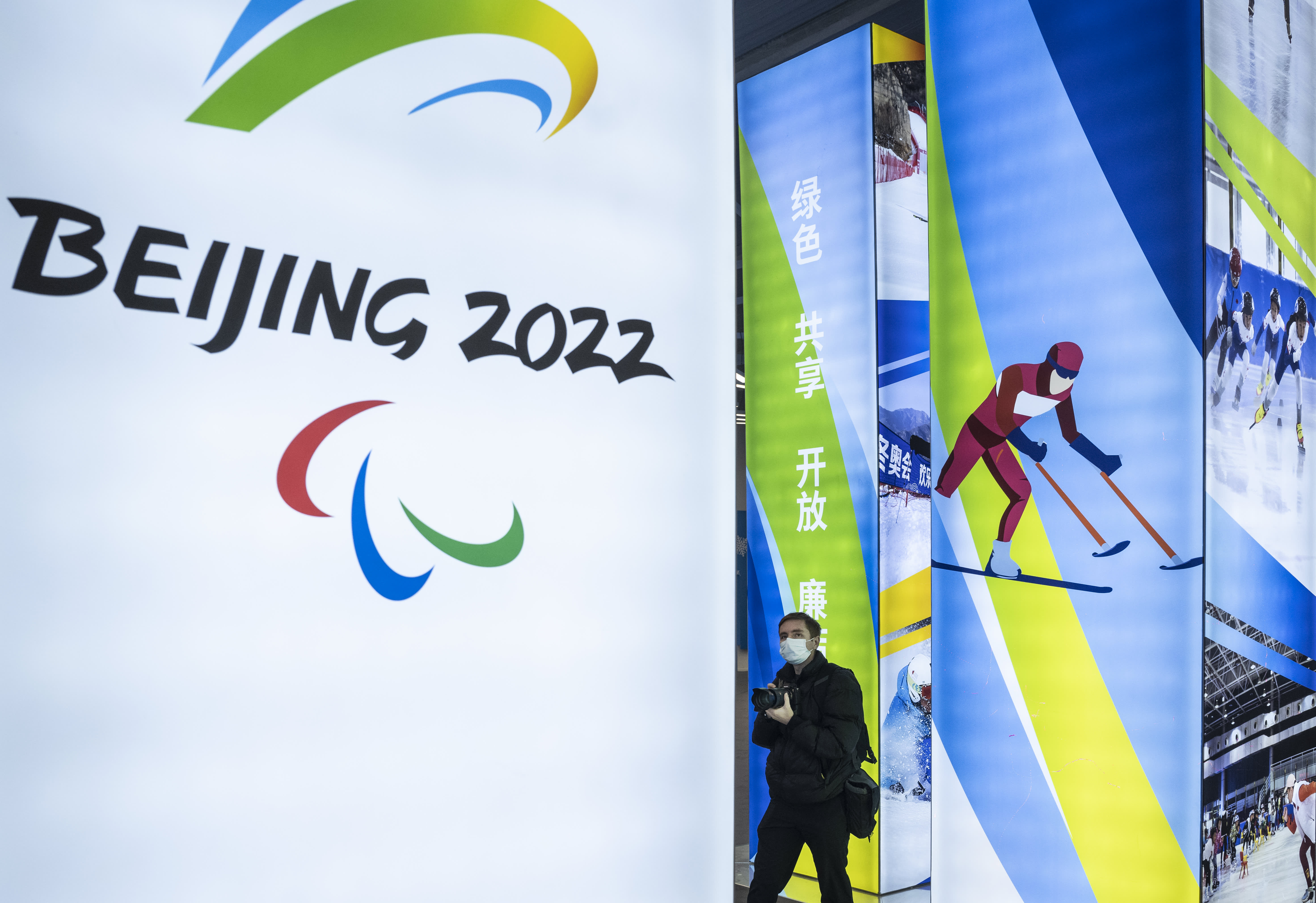
A journalist looks at a sample at the Beijing Winter Olympics 2022 Exhibition Center in Yaqing District on February 5, 2021 in Beijing, China.
Kevin Frayer | Getty Images
Countries and companies outside China are facing growing pressure to boycott the Beijing Winter Olympics next year, but China will not stand idly by in response, according to political risk consultancy Eurasia Group.
“Western governments and businesses are facing growing pressure from human rights defenders and political critics in China to boycott the Beijing 2022 Winter Olympics,” according to Eurasia Group analysts.
The Games will take place between February 4 and 20.
“China will punish countries that boycott the Games with political sanctions and trade retaliation, but with much more severity in the athletic boycott scenario,” they said in a report released Thursday.
“If a company does not boycott the Games, it runs the risk of damaging its reputation with Western consumers. But if it does, it runs the risk of being excluded from the Chinese market.
“Activists have focused on Beijing-led crackdown on Uyghurs in Xinjiang, which some Western governments have called ‘genocide,'” the report says. “Calls to shun what activists label as“ Games of Genocide ”will grow as the opening ceremony approaches, increasing the risks for governments, businesses and investors, whether they decide to boycott or not. “.
Last month, the governments of Canada, the United Kingdom and the United States issued a joint statement accusing the Chinese government of inflicting an “extensive program of repression” on the Uyghur people, including detention camps, forced labor and forced sterilizations.
China has repeatedly denied allegations of forced labor and other abuses in Xinjiang. The Foreign Ministry last month called the allegations “malicious lies” designed to “smear China” and “frustrate China’s development.”
Companies have also been caught in the crossfire.
In late March, H&M faced a backlash from China over a statement reportedly last year in which the Swedish retailer said it was “deeply concerned” by reports of forced labor in Xinjiang.
Proponents of the Olympic boycott argue that it is “necessary to punish China for its systemic discrimination against ethnic minorities in Tibet and Xinjiang, the repression of political freedoms in Hong Kong and hostility to self-government in Taiwan,” he says. Eurasia report.
Three types of boycott
Eurasia outlined three possible scenarios: a diplomatic boycott, an athletic boycott or the so-called “atypical scenario”.
1. Diplomatic boycott
The most likely scenario (with a 60% probability) is for the United States to join at least one other major Western country in the so-called diplomatic boycott of the Games.
“A diplomatic boycott is defined here as downgrading or not sending government officials to the Olympics and taking other reputable measures to deny Beijing light as a host,” analysts explained.
Eurasia said possible participants in a diplomatic boycott would be the US, Canada, the UK and Australia, with the possibility of some European countries joining.
However, in Asia, US partners such as Japan, India and South Korea – which have “more complex political dynamics” or deeper economic relations with China – are not expected to join. boycott.
The diplomatic approach is the least drastic scenario, according to Eurasia.
2. Athletic boycott
In this scenario, which has a 30% chance, one or more Western countries could prevent their athletes from participating in the Games, perhaps by applying internal political pressure. The economic boycott is defined as the prohibition of American viewers, broadcasters and sponsors.
“Athletic and economic boycotts, which are harder for the public to ignore, would force Beijing to take even tougher retaliation, possibly involving a diplomatic freeze and more widespread boycotts against consumers against Western brands,” analysts said. ‘Eurasia.
3. “Boycott lite”
This is an atypical scenario where tensions between the West and China are reduced, and there will be “slight political statements about the Games,” but there will be no formal boycott, analysts said, labeling it a “lite boycott.” .
It is the least likely scenario and has only a 10% chance of occurring, they said, adding: “There are currently not too many reasons for optimism about the trajectory of Sino-Western relations.”
Here, heads of state could refuse to attend the Games and cite programming conflicts or other non-political excuses. “The rhetoric would fall far short of Beijing’s enthusiastic endorsement as host, but there would be no declaration of boycott or presentation of a united Western position,” the report states.
Receiving from China?
A boycott of the Olympics “would diminish any soft power dividend” that Chinese President Xi Jinping hoped to obtain from the event, providing Beijing with “a platform to promote its global status among the national public and project a positive image for to billions of foreign viewers worldwide, ”Eurasian analysts said.
“Beijing will surely retaliate against countries involved in boycotts,” analysts said. “Beijing’s direct response to a diplomatic boycott would likely be a reciprocal boycott of Western events and sanctions against prominent boycott advocates.”
Increasingly, consumer companies based outside of China are trying to strike a balance: they project an image of human rights concerns on consumers outside of China, on the one hand, while avoiding being excluded from the massive Chinese consumer market. another.
“If a company does not boycott the Games, it runs the risk of suffering reputations with Western consumers. But if it does, it runs the risk of being excluded from the Chinese market,” analysts said.
Because of the Games ’high international profile, retaliation in China could be“ even worse ”than the current elimination of H&M’s commercial presence on the Chinese Internet, they said.
However, analysts say most companies will choose to participate in the Olympics, as “the potential cost of losing access to the Chinese market is likely to outweigh concerns about a Western consumer reaction,” Eurasia predicts. which will probably be brief.
– CNBC’s Arjun Kharpal contributed to this report.